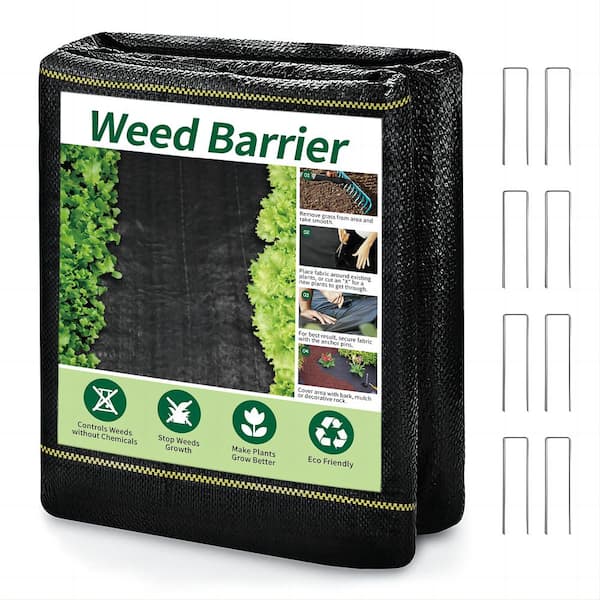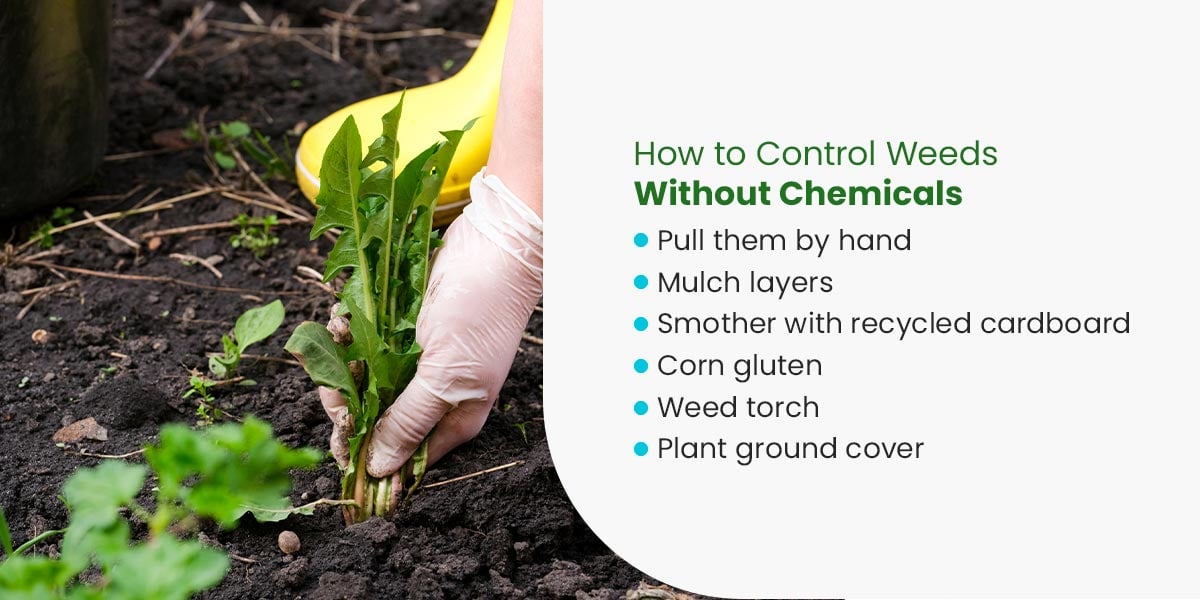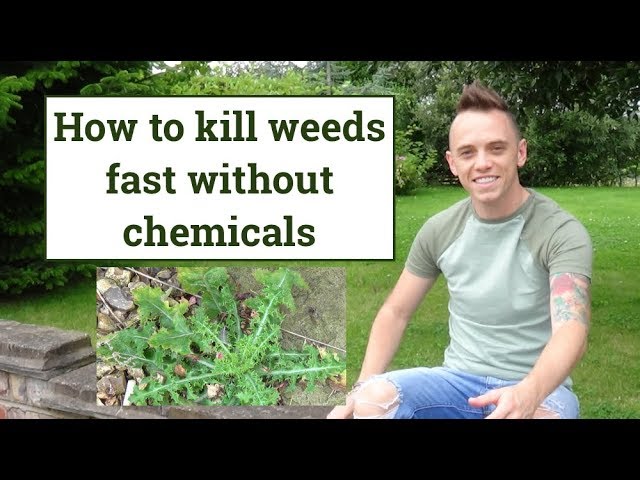Are you tired of battling those pesky weeds that seem to pop up just when your garden is starting to thrive? You’re not alone.
Weeds can be a gardener’s worst nightmare, but what if you could control them without resorting to harsh chemicals? Imagine stepping into your garden, feeling the soft soil under your feet, and knowing that every plant is thriving naturally. The good news is, you can achieve this dream.
You’ll discover effective and natural methods to keep those stubborn weeds at bay, ensuring your garden remains a safe and eco-friendly haven. Keep reading to find out how to transform your garden into a weed-free paradise without any harmful chemicals.
Mulching Techniques
Mulching is a powerful ally in your battle against weeds. This eco-friendly technique creates a protective layer over soil, preventing sunlight from reaching weed seeds. As a bonus, mulch can enrich your soil and help retain moisture, making it a triple win for your garden. Let’s dive into some effective mulching techniques that can transform your gardening experience.
Organic Mulch Choices
Organic mulch is made from natural materials like straw, wood chips, or shredded leaves. It’s easy to find and inexpensive. Spread a thick layer—about 2 to 4 inches—over your garden beds. This suffocates weeds while slowly breaking down to nourish the soil.
What’s your favorite organic mulch? Consider experimenting with different types to see which works best for your plants. You might be surprised by how effective some local materials can be.
Using Newspaper Or Cardboard
Newspaper and cardboard are excellent for weed control. Lay them directly on the soil, overlapping sheets to cover every inch. They block light and air, making it tough for weeds to grow.
In my garden, I’ve found that using old newspapers works wonders. It’s a great way to recycle and keep weeds at bay. Just ensure you wet the paper before covering it with mulch to prevent it from blowing away.
Living Mulch Options
Living mulch involves planting ground covers that outcompete weeds. Clover and vetch are popular choices. They not only suppress weeds but also add nitrogen to the soil.
Could living mulch be the answer for you? It’s an attractive option that enhances biodiversity in your garden. Plus, watching these plants thrive can be incredibly satisfying.
Plastic Mulch: Pros And Cons
Plastic mulch offers a robust defense against weeds. It’s durable and effective at blocking sunlight. However, it can be less eco-friendly and might alter soil temperature.
If you’re considering plastic mulch, weigh its benefits against environmental impacts. Is it worth the trade-off for your garden’s needs? Sometimes, a combination of mulching methods might be the most balanced approach.
Mulching techniques are a gardener’s secret weapon. They offer a sustainable way to control weeds while benefiting the ecosystem. What’s stopping you from trying a new method today? Your garden might just surprise you with its resilience and beauty.
Manual Weed Removal
Pulling weeds by hand offers a chemical-free approach to garden maintenance. This method keeps the soil healthy and preserves beneficial insects. Regular manual removal prevents weeds from spreading, ensuring a clean and thriving garden environment.
Controlling weeds naturally is a rewarding endeavor. Manual weed removal offers a hands-on approach to maintaining a healthy garden. It’s a method that allows you to get up close and personal with your plants, understanding their needs while keeping the unwanted invaders at bay. You might discover that it’s not just about pulling weeds; it’s about connecting with your garden in a meaningful way.Understanding The Basics Of Manual Weed Removal
Manual weed removal is straightforward and effective. It’s the art of physically pulling weeds from the ground. This method requires patience and persistence but provides immediate results. Be sure to remove the entire root to prevent regrowth. Leaving roots behind can lead to a resurgence of weeds, often stronger than before.Tools For Effective Weed Removal
Having the right tools makes all the difference. Consider investing in a sturdy hand trowel or a specialized weed puller. These tools help you get to the root of the problem—literally. A garden kneeler can save your knees while you work. Comfort matters when you’re spending hours nurturing your plants.Timing Is Everything
Pulling weeds is most effective when done regularly. The best time to tackle weeds is after rain when the soil is moist. This makes it easier to remove the entire root. Early morning or late afternoon are ideal times to work in the garden. These are cooler parts of the day, making the task more pleasant.Dealing With Tough Weeds
Some weeds are more stubborn than others. For tougher weeds, consider soaking the area with water to loosen the soil. This can make it easier to pull them out completely. If a weed refuses to budge, you might need to dig around it a bit. Be careful not to disturb your plants in the process.Maintaining A Weed-free Garden
Consistency is key to keeping your garden weed-free. Make weed removal a regular part of your gardening routine. Consider setting a weekly schedule to inspect and remove weeds. This keeps your garden healthy and thriving.Personal Reflection: The Joy Of Manual Weed Removal
I remember spending hours in my grandmother’s garden, pulling weeds by hand. It was hard work, but it taught me patience and persistence. There’s a unique satisfaction in seeing a clean garden bed. Each weed pulled is a step towards a healthier garden and a clearer mind.Engaging With Your Garden
Manual weed removal isn’t just a chore—it’s an opportunity. How does spending time with your plants change your perspective on gardening? Reflect on the connection you build with your garden. Notice the subtle changes and growth, and appreciate the effort that goes into maintaining it. Manual weed removal is an art. It’s about being present and mindful, ensuring your garden remains a peaceful sanctuary.Using Cover Crops
Cover crops offer an effective way to manage weeds without chemicals. They cover soil, blocking sunlight and preventing weed growth. By improving soil health, cover crops naturally suppress unwanted plants, making them an eco-friendly choice for farmers and gardeners.
Controlling weeds without chemicals is a sustainable gardening practice that many are embracing. One effective method is using cover crops. Cover crops are plants grown primarily to benefit the soil rather than for harvest. They can suppress weeds, improve soil health, and add nutrients. It’s a smart way to manage your garden naturally.What Are Cover Crops?
Cover crops are not your typical garden plants. They’re like guardians for your soil. These crops include clover, rye, and oats. They grow quickly and cover the ground, blocking weeds from getting the sunlight they need to grow. Imagine having a natural blanket over your garden that keeps pesky weeds at bay.Why Use Cover Crops?
You might wonder why you should use cover crops instead of just pulling weeds. Using cover crops is less labor-intensive. They work while you rest. By planting them, you let nature handle the weeds. Plus, they enrich the soil, making it healthier for future plants. It’s a win-win situation.How To Choose The Right Cover Crop
Selecting the right cover crop is crucial. Consider your climate and soil type. Some cover crops thrive in cooler weather, while others prefer warmth. Think about the problems your garden faces. If erosion is a concern, choose rye. If improving nitrogen levels is your goal, try clover. The right cover crop can address specific needs in your garden.Planting Cover Crops
Planting cover crops is straightforward. Scatter the seeds over your garden and gently rake them into the soil. Water them well, and soon you’ll see a lush green carpet. It’s almost magical how quickly they grow. I tried this in my own backyard last year, and the results were impressive. My garden looked healthier, and the weeds were minimal.Maintaining Cover Crops
Maintaining cover crops is easy. Let them grow until they’re ready to be cut down or turned into the soil. This process is known as “green manure.” It’s like giving your soil a nutrient-packed meal. As the cover crops decompose, they enrich the soil, preparing it for your next planting season.Benefits Beyond Weed Control
Cover crops offer more than just weed control. They prevent soil erosion, improve water retention, and boost soil fertility. They can also attract beneficial insects, enhancing the biodiversity of your garden. Have you ever thought about how a simple plant could do so much?Using cover crops is an effective way to control weeds naturally. It’s a method that provides multiple benefits with minimal effort. Could this be the solution you’ve been looking for in your garden?

Natural Herbicides
Natural herbicides offer a safer way to manage weeds without using chemicals. They rely on ingredients like vinegar or salt to kill unwanted plants. This eco-friendly approach protects the environment and keeps gardens healthy.
Controlling weeds in your garden without relying on chemicals can be both rewarding and eco-friendly. Natural herbicides offer a way to tackle unwanted plants using methods that are safe for the environment and your health. These solutions are often easy to prepare and use, making them accessible for anyone keen to maintain a lush, healthy garden.Vinegar As A Weed Killer
Vinegar is not just for salads. Its high acidity can be effective in killing weeds, especially those pesky ones sprouting in cracks. Simply spray undiluted vinegar directly onto the leaves of the weeds. Do this on a sunny day for best results, as the sun helps intensify the vinegar’s effect. Remember, while vinegar works well on small weeds, it might require repeated applications for larger ones.Salt Solution
Salt is another common household item that can help keep your garden weed-free. Mix a solution of salt and water (three parts water to one part salt) and apply it to the base of the weeds. Be cautious: salt can affect soil health, so it’s best used on paths or driveways rather than garden beds. You wouldn’t want your tomatoes growing in salty soil, right?Boiling Water
Boiling water is a simple yet effective method for killing weeds. Pouring it directly onto weeds can cause them to wilt and die quickly. This is particularly useful for weeds growing in sidewalks or driveways. It’s a quick fix, but be careful not to splash on desirable plants. You wouldn’t want to be responsible for a garden accident.Homemade Herbicide Mix
Creating a homemade herbicide mix can be an exciting experiment. Combine vinegar, salt, and a bit of dish soap in a spray bottle. This concoction can tackle a variety of weeds. The soap helps the mixture stick to the leaves, increasing its effectiveness. Have you tried creating your own herbicide? It might be your next garden project.Essential Oils
Essential oils aren’t just for aromatherapy; they can also combat weeds. Clove oil, in particular, has strong weed-killing properties. Mix a few drops of clove oil with water and spray it onto the weeds. This method is gentle on the environment but tough on weeds. Plus, it leaves a pleasant scent in your garden. Taking control of weeds naturally can be satisfying and beneficial for the planet. What natural solutions have you tried in your garden? Exploring these options might just lead to your next big gardening success story.
Conclusion
Controlling weeds without chemicals is simple and effective. Natural methods protect the environment and your health. Mulching is a great way to block sunlight from weeds. Regularly pulling weeds keeps them from spreading. Boiling water can kill unwanted plants fast.
Vinegar is another natural option to try. These methods are cost-effective and easy. Your garden can stay beautiful and chemical-free. Start using these techniques today. Enjoy a cleaner, greener space. Embrace a healthier lifestyle for you and your plants. Happy gardening!



